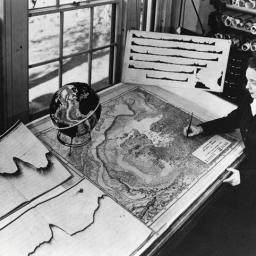
If you enjoy reading about the history of science, this is a great story: the history of geologist Marie Thorp, whose methodical plotting and cataloging of mid-ocean SONAR data
led to the discovery and mapping of the mountainous ridges that bisect the world's oceans. That discovery in turn helped validate the geologic theory of continental drift, which until then had been dismissed by even serious, erudite scientists as a bit of poetry and imagination.
In late 1952, as Tharp was replotting the ocean floor, Heezen took on another deep-sea project searching for safe places to plant transatlantic cables. He was creating his own map, which plotted earthquake epicenters in the ocean floor. As his calculations accumulated, he noticed something strange: Most quakes occurred in a nearly continuous line that sliced down the center of the Atlantic. Meanwhile, Tharp had finished her second map-a physiographic diagram giving the ocean floor a 3-D appearance-and sure enough, it showed the rift again. When Heezen and Tharp laid their two maps on top of each other on a light table, both were stunned by how neatly the maps fit.
An interesting read that's surprisingly heart-warming: amazing to see how facts become knowledge and knowledge leads to understanding.
In the movement toward patent reform, the Patent Office, Congress, and the courts aren't the only targets for change. Individual and corporate patent owners have steps they can take to reduce the harmful effects of software patents and disempower patent trolls, largely through alternative licensing schemes.
The EFF announces:
We're excited to announce the first set of patents released under one such scheme, the Defensive Patent License (DPL). The 23 patents, owned by EFF cofounder John Gilmore, were created by Pixel Qi, a startup that aimed to advance low-power LCD screens. With these patents under the DPL, anyone can license them royalty-free as long as they license their own patents (and commit to licensing future patents) under the same terms-even if they don't have any patents at all.
The Defensive Patent License, pioneered by a team at NYU and Berkeley law schools with support from EFF, sets out to create an environment where patents aren't bludgeons for offensive litigation campaigns, abused by companies to engage in expensive lawsuits and by trolls to threaten true innovators. Inspired by free software and free cultural license, the DPL allows for patent-owners and developers to benefit from openly sharing their portfolio.
Interested in more? Check out the EFF's
Hacking the Patent System Guide [PDF], available from their website. Back under the bridge with you, trolls!
Pity those poor advertisers, who are outraged, to say the least. A recent study has shown that
computers being remotely operated by hackers account for almost one in four views of digital video ads worldwide. The fraud leads advertisers to spend approximately $6.3 billion dollars per year for advertising that doesn't have any impact whatsoever. The fake views, which also account for 11 percent of other display ads, often take place in the middle of the night when the owners of the hijacked computers are asleep.
The advertising unions are understandably upset.
"We're being robbed," said Bob Liodice, president and chief executive officer of the New York-based association, which has 640 members that spend more than $250 billion a year in advertising. "This isn't about system inefficiencies or process sloppiness. This is about criminal activity."
But others would say, that's the way the game is played. No word on who wrote the software that manages these fake video views, or who benefits. Finally, pity the poor robots, people, forced to watch video ads all day and night: what a dreary existence!

It's not that the Pirate Bay may cease to exist, although with this most recent raid by Swedish authorities, that may be true as well. It's that since a couple of years ago,
the Pirate Bay has become a shadow of its former self, and changed in ways some users would call fundamental.
TPB has become an institution that people just expected to be there. Noone willing to take the technology further. The site was ugly, full of bugs, old code and old design. It never changed except for one thing - the ads. More and more ads was filling the site, and somehow when it felt unimaginable to make these ads more distasteful they somehow ended up even worse.
The original deal with TPB was to close it down on it's tenth birthday. Instead, on that birthday, there was a party in it's "honour" in Stockholm. It was sponsored by some sexist company that sent young girls, dressed in almost no clothes, to hand out freebies to potential customers. There was a ticket price to get in, automatically excluding people with no money. The party had a set line-up with artists, scenes and so on, instead of just asking the people coming to bring the content. Everything went against the ideals that I worked for during my time as part of TPB.<\a>
What's next for The Pirate Bay?
 If you enjoy reading about the history of science, this is a great story: the history of geologist Marie Thorp, whose methodical plotting and cataloging of mid-ocean SONAR data led to the discovery and mapping of the mountainous ridges that bisect the world's oceans. That discovery in turn helped validate the geologic theory of continental drift, which until then had been dismissed by even serious, erudite scientists as a bit of poetry and imagination.
If you enjoy reading about the history of science, this is a great story: the history of geologist Marie Thorp, whose methodical plotting and cataloging of mid-ocean SONAR data led to the discovery and mapping of the mountainous ridges that bisect the world's oceans. That discovery in turn helped validate the geologic theory of continental drift, which until then had been dismissed by even serious, erudite scientists as a bit of poetry and imagination.